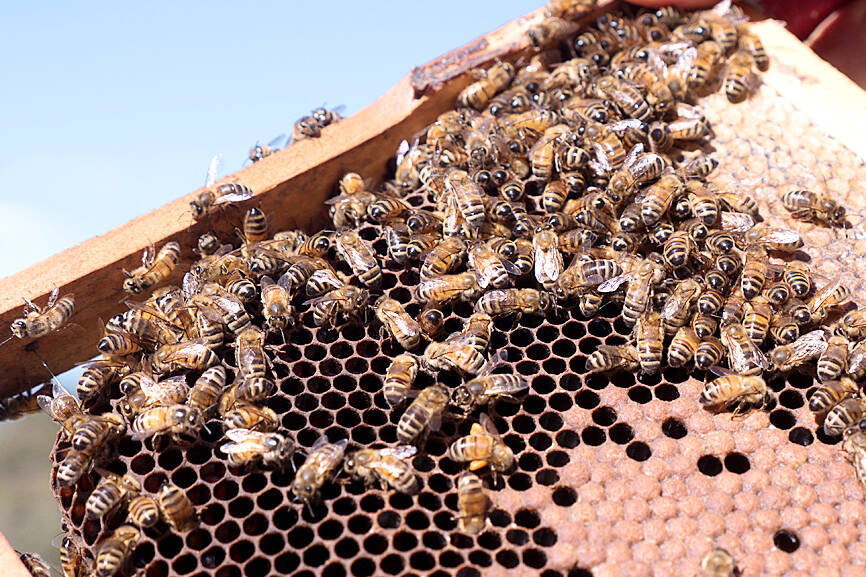Australian honey producers scored a win in their legal tussle with New Zealand over the use of the term “manuka honey” in the UK and Europe — though the Kiwis say it may be a short-lived victory.
The two neighboring nations have been locked in legal proceedings for the past five years after a group of New Zealand honey producers sought to prevent their Australian counterparts from using the description in various countries.
In the latest development, New Zealand’s Manuka Honey Appellation Society (MHAS) discontinued its High Court appeal in the UK to trademark the words “manuka honey” just days before Christmas, weeks after withdrawing its application for a certification mark in the EU.

Photo: AFP
“The MHAS backdown means the UK Intellectual Property Office ruling of December 2021 in Australian beekeepers’ favor stands, and there is no restraint or trademark on Manuka naming rights,” Australian Manuka Honey Association (AMHA) chairperson Paul Callander said.
However, John Rawcliffe, chief executive officer of New Zealand’s Unique Manuka Factor Honey Association and a member of MHAS, said the legal withdrawal was strategic and the group plans to refile the appeal.
At stake is access to the international manuka honey market, which is forecast to be worth around A$1.27 billion (US$893 million) in annual trade by 2027, with products containing the pricey sweetener selling between A$300 to A$500 per kilo, according to the AMHA.
Manuka honey, sought after for its antibacterial properties and purported health benefits, is made by bees that pollinate the Leptospermum scoparium, or manuka tree, which grows throughout New Zealand and in some parts of Australia.
However, MHAS claims the word “manuka” has a Maori origin, and therefore is a distinctive product of New Zealand, with Rawcliffe saying differences in climate, surrounding plants and soil meant only the Kiwis could produce the true honey.
“Manuka is an Australian native plant and the term Manuka honey has long been used in Australia to describe this unique honey,” Callander said. “Australian growers have every right to use the word to describe their produce, as upheld by the UK Courts.”
MHAS has also attempted to trademark the term in New Zealand, the US and China. Actions in China and the US were thrown out, and are pending in New Zealand.

Popular vape brands such as Geek Bar might get more expensive in the US — if you can find them at all. Shipments of vapes from China to the US ground to a near halt last month from a year ago, official data showed, hit by US President Donald Trump’s tariffs and a crackdown on unauthorized e-cigarettes in the world’s biggest market for smoking alternatives. That includes Geek Bar, a brand of flavored vapes that is not authorized to sell in the US, but which had been widely available due to porous import controls. One retailer, who asked not to be named, because

Real estate agent and property developer JSL Construction & Development Co (愛山林) led the average compensation rankings among companies listed on the Taiwan Stock Exchange (TWSE) last year, while contract chipmaker Taiwan Semiconductor Manufacturing Co (TSMC, 台積電) finished 14th. JSL Construction paid its employees total average compensation of NT$4.78 million (US$159,701), down 13.5 percent from a year earlier, but still ahead of the most profitable listed tech giants, including TSMC, TWSE data showed. Last year, the average compensation (which includes salary, overtime, bonuses and allowances) paid by TSMC rose 21.6 percent to reach about NT$3.33 million, lifting its ranking by 10 notches

CHIP DUTIES: TSMC said it voiced its concerns to Washington about tariffs, telling the US commerce department that it wants ‘fair treatment’ to protect its competitiveness Taiwan Semiconductor Manufacturing Co (TSMC, 台積電) yesterday reiterated robust business prospects for this year as strong artificial intelligence (AI) chip demand from Nvidia Corp and other customers would absorb the impacts of US tariffs. “The impact of tariffs would be indirect, as the custom tax is the importers’ responsibility, not the exporters,” TSMC chairman and chief executive officer C.C. Wei (魏哲家) said at the chipmaker’s annual shareholders’ meeting in Hsinchu City. TSMC’s business could be affected if people become reluctant to buy electronics due to inflated prices, Wei said. In addition, the chipmaker has voiced its concern to the US Department of Commerce

STILL LOADED: Last year’s richest person, Quanta Computer Inc chairman Barry Lam, dropped to second place despite an 8 percent increase in his wealth to US$12.6 billion Staff writer, with CNA Daniel Tsai (蔡明忠) and Richard Tsai (蔡明興), the brothers who run Fubon Group (富邦集團), topped the Forbes list of Taiwan’s 50 richest people this year, released on Wednesday in New York. The magazine said that a stronger New Taiwan dollar pushed the combined wealth of Taiwan’s 50 richest people up 13 percent, from US$174 billion to US$197 billion, with 36 of the people on the list seeing their wealth increase. That came as Taiwan’s economy grew 4.6 percent last year, its fastest pace in three years, driven by the strong performance of the semiconductor industry, the magazine said. The Tsai